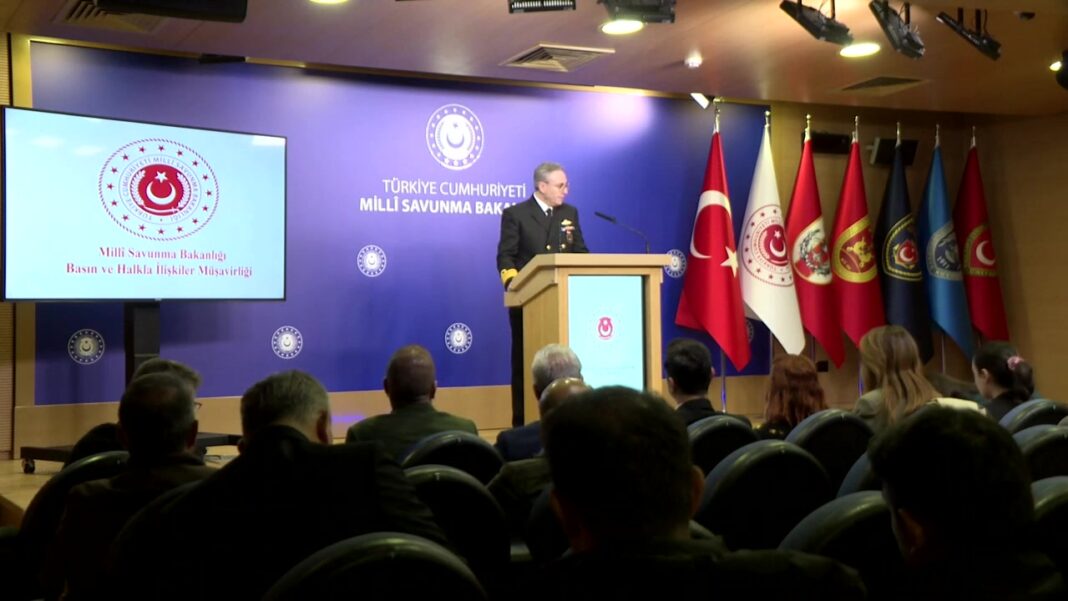Turkey’s defense ministry vowed to prevent Kurdish militants from capitalizing on the renewed instability in Syria, the state-run Anadolu news agency reported on Thursday, as a coalition of anti-regime forces, including the Islamist militants of Hayat Tahrir al-Sham (HTS), captured significant territory in Syria, including the city of Aleppo.
“All necessary measures are being taken by our troops to maintain stability in the region, and close cooperation and coordination with our counterparts in the region continue,” Anadolu quoted Defense Ministry spokesman Rear Admiral Zeki Aktürk as saying during the ministry’s weekly press briefing.
Aktürk briefed the press on Turkey’s ongoing military operations against the outlawed Kurdistan Workers’ Party (PKK) and what Ankara views as PKK’s Syrian branch, the People’s Protection Units (YPG), claiming that since January, Turkish forces have “neutralized” 2,664 PKK and YPG militants, including 1,272 in northern Syria. Aktürk underlined Turkey’s intent to continue its operations “with determination until there is not a single terrorist left.”
Rebel advance shakes Syria’s power dynamics
The Turkish statement comes amid a dramatic offensive by a coalition of rebel groups, including HTS, which has captured Aleppo and is advancing south into regime-held areas near Hama. The coalition has also captured more than 200 surrounding towns, breaking what was thought to be a deadlock in Syria’s decades-long conflict.
HTS, which emerged from the Syrian al-Qaeda offshoot Jabhat al-Nusra, is classified as a terrorist organization by Turkey, the United States and other international actors. However, the Turkish Ministry of Defense referred to the group as “opposition forces” in its latest briefing, sparking criticism and raising questions about Ankara’s position.
The Turkish government, which has supported rebel groups in Syria since the start of the conflict in 2011, has provided weapons and logistical support to the Syrian National Army (SNA), a coalition of rebel groups also involved in the current offensive. Analysts suspect that Ankara probably authorized the operation in order to counter Kurdish autonomy in northeastern Syria.
The escalation comes at a time when regional powers are reassessing their role in Syria. Russian forces, Syrian President Bashar al-Assad’s main backers, have reduced their presence due to the war in Ukraine, while Iran’s influence has waned following intensified clashes with Israel. These shifts have left Assad’s forces vulnerable to a renewed rebel push.
Experts believe the Turkish-backed SNA is aiming to break Kurdish control in northeastern Syria, where the US-backed Autonomous Administration of North and East Syria (AANES) rules. The Turkish government regards the AANES and its main militia, the YPG, as an extension of the PKK, which Ankara and its Western allies consider a terrorist group.
“Turkey is focused on ensuring that the PKK/YPG does not exploit the instability to consolidate power,” Aktürk said, reiterating Turkey’s refusal to withdraw from its self-declared “security zones” in northern Syria, where Turkish forces have been stationed since 2016.
HTS, despite its claims of rebranding and distancing from extremist ideology, remains controversial due to its Islamist roots and history of human rights abuses.
Critics argue that Ankara’s support for the rebel offensive could exacerbate instability.
“Turkey’s actions are undermining long-term stability in Syria,” Sinam Mohamad, a representative of the Syrian Democratic Council, the political wing of the AANES told the Vox news website. She accused HTS and the SNA of targeting minorities and warned of potential displacement.
The resurgence of fighting has triggered renewed displacement. International monitors report that thousands of civilians are fleeing contested areas, while Russian and Syrian airstrikes have targeted hospitals and infrastructure in rebel-held territories. Human rights groups accuse all sides of committing violations against civilians.
President Recep Tayyip Erdoğan has reiterated plans to resettle millions of Syrian refugees currently in Turkey into northern Syria, a move widely criticized as forced displacement.
The conflict’s resurgence has drawn international attention, with the US, Russia and other actors calling for de-escalation. Analysts warn that the offensive could prolong Syria’s civil war and destabilize the broader Middle East.
“The war in Syria is not over,” said Robert Ford, former US ambassador to Syria, was quoted by Vox as saying. “The recent rebel gains demonstrate the fluidity of the conflict and the ripple effects it can have globally.”


